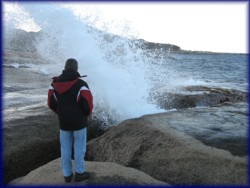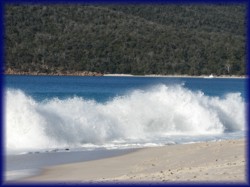|
Divine water music
Many man-made sounds are enough to send anybody diving for cover like a dog seeking refuge from thunder. The scraping of fingernails on a chalk board, the high-pitched whine of a dentist's drill, a car's backfire, a child practicing on an untuned violin, city traffic - each one seems designed to test any normal person's fortitude. Contrast this cacophony of irritants with nature's own sweet suite of sound treats. Take natural water music, for instance; the numerous strains produced by moving water in all its possible forms invariably soothe harried hearts, refresh weary spirits, and inspire attuned souls. Have you ever heard an ugly water sound in the wild?
Water music is a consequence of the natural law that insists on the conservation of energy; when a moving object (having kinetic energy) is resisted by some force, the reduction of kinetic energy must be precisely matched by a transformation into other forms of energy - sound, electromagnetism, heat, ground waves, chemical energy, and so on. When two cars collide, the kinetic energy is transformed into heat (which quickly dissipates into the air), a crashing sound, and ground vibrations. Still water produces no sound; moving water has kinetic energy which must be changed into something else when the movement is resisted by, say, stones in the riverbed or sand on the seashore. When that happens, water music is born.
I have to turn the clock back only two days for my most recent experience of stunning water music. To celebrate our anniversary, Martha and I spent a couple of days in a seaside cottage on Tasmania's famed east coast. The surf coming in off the Tasman Sea was running wild, pounding the sandy beach with a relentless barrage of crashing waves. Even though it is mid-winter, we opened our bedroom window as wide as we could stand in order to be treated to the unique sound of water colliding with water and crashing on sand; mesmerizing, magical, magnificent. I'm willing to bet that nobody can reproduce that sound, with its endless subtleties, by artificial means.
Then yesterday we went on the most delightful nature walk we have ever enjoyed; we hiked into what must be one of the world's most stunningly beautiful geological phenomena, Wineglass Bay. (Decades ago, Queen Elizabeth II's Royal Yacht Britannia moored in the bay for a few hours while she was boated ashore to enjoy a picnic on its pristine sands.) The impact of the scenery (and the cruising seal) on the eyes was so riveting it was difficult to switch gears to concentrate on the sounds, but when we did so we were rewarded with a remarkable variation on the theme of crashing surf. Here the sand sloped down sharply into the bay, markedly shortening the length of time between "bud and flower"; each wave had a lifespan of only two or three seconds. Instead of breaking gradually, each wave would hump rapidly then literally collapse in aheap on the steeply-sloping sand
|
producing a whip-like water crack the likes of which we had never heard before (top right). When you got close enough to hear it, the crack was instantly followed for a second by the popping of millions of bubbles. I wish you could have been there, too.
Then you have smaller, more "ordinary" waves breaking on a gradually-sloping beach, in which case the major theme consists of the gentle swishing of the returning water as it rushes across the sand. Maybe not as dramatic as mega-surf, but delightful nevertheless, and soothing to boot.
An hours drive from here is a stony beach that slopes down steeply into Bass Strait, from which medium-sized waves pay regular visits. Here the real music is not strictly water music, I guess, but I can't resist telling you about it. As the receding water rushes down the steep stony slope it turns over hundreds of small rounded stones and bangs them against neighboring stones producing a clicking stone symphony that most people could listen to for hours.
How different a timbre is produced - what could perhaps best be described as a thud - when identical waves smack into a rock face or, for another variation, race up a tunnel worn into a rock outcrop and are brought to an abrupt halt at an enclosed dead end, or, as Martha and I experienced this weekend, are ejected at high speed as a spout through a "blowhole" (top left). All different, all lovely.
Water music is not limited to seaside symphonies. The one percussion instrument can produce a remarkable array of concertos depending on how it's played. Who is up to the task of adequately describing the numerous sounds produced by flowing water? Hopefully, you are familiar with many of its variations yourself, from the gurgling of a gentle rivulet's trickle to the thunder of a mountain stream in flood, and everything in between, and so don't need a description. Have you ever heard flowing water trapped in a cave, its emanations echoing from the surrounding rocks? I have sat on a rock in a wet cave in the pitch dark and gotten as lost in the music as when listening to a professional orchestra play Dittersdorf's harp concerto. And then you have the special case of flowing water in the form of waterfalls; thoroughly enchanting.
Nature also provides more genteel water sounds, such as the dripping of water from a melting icefall or the fizzing of champagne. (I guess nature has a little help there.) How about the hissing of a geyser or the sucking of an intense gyre?
The only plain-thinking way to account for the universal pleasurableness of nature's water music is by acknowledging its divine origin. Water music truly is divine, in both meanings of that word. Water: flowing, dripping, crashing, falling, trickling, fizzing, swishing, plunking, sucking - the Master Composer made it all.
|





